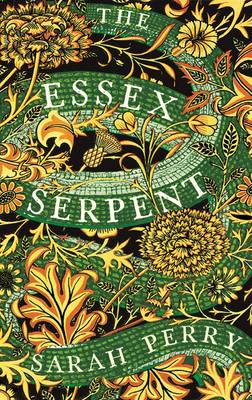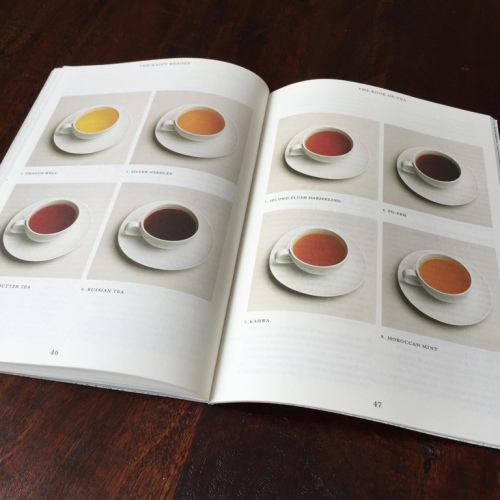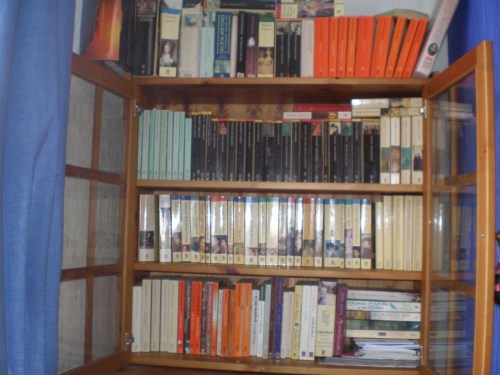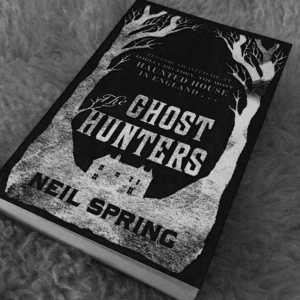In my last review I talked about the importance of books that make you face, head on, some of the awful things that are going on in the world, the power of fiction being able to send you into the heads of those you wouldn’t choose to be for various reasons. Today I want to talk to you about the supreme power at the opposite end of the spectrum that fiction can have, the ability to take you away to another place, time and world wrapped in escapism and joy that is one of the main reasons that we read. Sarah Perry’s wonderful second novel, The Essex Serpent, is just such a book and one which (as easily one of my favourite books of the year so far) I will be urging you all to go and escape with it as soon as you can.
Winter comes like a blow to the back of his neck: he feels it penetrate his shirt and go into his bones. The good cheer of drink is gone, and he’s comfortless there in the dark – he looks for his coat, but clouds hide the moon and he is blind. His breath is slow, the air is full of pins; the marsh at his feet all at once is wet, as if something out there has displaced the water. Nothing, it’s nothing, he thinks, patting about for his courage, but there it is again: a curious still moment as if he were looking at a photograph, followed by a frantic uneven motion that cannot merely be the tug of the moon on the tides. He thinks he sees – is certain he sees – the slow movement of something vast, hunched, grimly covered over with rough and lapping scales; then it is gone.
In the darkness he grows afraid. There is something there, he feels it, biding its time – implacable, monstrous, born in water, always with an eye cocked in his direction.
The small close knit town of Aldwinter is in shock, as it seems that the Essex Serpent has returned after over 200 years when it last infamously terrorised the area. One of the townsmen has been found dead, with a petrified look upon his face, and soon enough fear is running rife through the area as cattle and people start to be reported as missing. This is not good news for William Ransom, the local rector, who refuses to believe (or cannot believe) that such a thing exists and refuses to name it as anything other than ‘the Trouble’, yet his congregation are afraid and starting to question his preaching further unsettling the town.
Further afield though nothing could be more exciting, or indeed more needed, for recently widowed Cora Seaborne than a possible adventure. With a fascination for fossils and palaeontology from the moment she hears of the ‘Strange News Out of Essex’ (which is also the name of the first part of the book, each part gets a wonderfully tempting title in a delicious nod to the Victorian sensation novels of the day) she sets off in search of it and any other prehistoric hints in the marshes and estuaries. This being bad news for Dr Luke Garrett, who loves Cora and her rousing spirit and believes that after her grieving there might be a chance for love. But who could second guess such a woman?
‘I daresay you have heard tell of the Essex Serpent, which once was the terror of Henham and Wormingford, and has been seen again?’ Delighted, Cora said that she had not. ‘Ah,’ said Taylor, growing mournful, ‘I wonder if I ought not trouble you, what with ladies being of a fragile disposition.’ He eyed his visitor, and evidently concluded that no woman in such a coat could be frightened by mere monsters.
Cora Seaborne is one of Sarah Perry’s many masterstrokes within The Essex Serpent. It is hard to create a women of heightened independence in the Victorian period, ironic seeing as who the period was named after, who is believable. More often than not you have to go for the cheeky buxom wench like Nancy in Oliver Twist or some monstrous matriarch. However Cora is a widow which both gives her the means to have the independence that she desires yet at what cost? For as we read on behind Cora’s seemingly excitable and joyful exterior there is a vulnerable side and a darker story hidden away. I loved this because it adds layers to her as a character and also to the plot with an additional mystery. Not many authors can pull this off.
Having scoured its river for kingfishers and its castle for ravens, Cora Seaborne walked through Colchester with Martha on her arm, holding an umbrella above them both. There’d been no kingfisher (‘On a Nile cruise, probably – Martha, shall we follow them?’), but the castle keep had been thick with grave-faced rooks stalking about in their ragged trousers. ‘Quite a good ruin,’ said Cora, ‘But I’d have liked to’ve seen a gibbet, or a miscreant with pecked-out eyes.’
Yet a novel about an independent woman in the Victorian era would almost be too easy for our author, which is one of the things I loved about its predecessor. Perry pushes the boundaries of what we expect, she is all about the deeper layers, rather like the estuaries we visit in the story, and the cheeky winks and nods in this book. Why simply have a mysterious tale of a possible monster and the rector and female amateur scientist who try to hunt it down, with a hint of potential illicit romance and shenanigans thrown in for good measure (though that is a perfect book right there) when you can do more? Why not throw in the question of platonic love vs. sexual attraction and see what can be weaved and unravelled out of that?
Then, if you’re in the mood which Perry clearly was, why not look at other things going on in society then that are still conundrums now. Questions about feminism, class, science vs. religion? Sarah Perry hasn’t just made Cora’s love interests be a rector and a doctor for your reading pleasure, although it adds to it hugely so of course she has, there is more going on here. In doing so certain questions and dynamics make the book brim all the further. Why is it that Luke Garrett is so desperate to mend physical broken hearts after all? Why will William not be ruled by his head or his heart? These all lead off to a wonderful dark subplots that I won’t spoil but I bloody loved.
I also mentioned those lovely winks and nods didn’t I? Well these are further proof of what a superb mind can use to create such a superb book. In the 1890’s sensation novels were all the rage and Sarah Perry takes these wonderful books and pays homage to them and also plays with them. She takes many of the standard glorious Gothic tropes and waves at them joyously. Possible monsters in eerie boggy marshes (which are written so atmospherically) and bodies petrified to death take you to the world of Sherlock Holmes. The Woman in White, and indeed the Woman in Black, are winked at with a Woman in Blue – which in the authors notes are also a nod to Maggie Nelson’s Bluets which made me want to squeeze Sarah to bits with unbridled love and may get me arrested or a restraining order. Servants clearly smitten with their mistresses give a hint of Rebecca. Okay, I know that some of those are the wrong era but two are gothic and some of my favourites. Rather like her writing prose in contemporary English rather than of the period these all add to the atmosphere and yet keep it fresh and different.
She also flip reverses (if any of you now have that Blazin’ Squad hit single in your head I now love you) many of these tropes on their head. When is the rector ever a sex object or the rich widow doing anything but being a bitch or scheming to marry and kill off another husband, for example? Sarah Perry also uses some wonderful knowing hindsight between the reader and herself with them. A prime example is Cora’s son who everyone thinks is just a bit sinister and odd, who we all see as clearly being autistic and misunderstood – well I thought so. Sarah is enjoying writing this book as much as you are reading it and there is a communication going on between author and reader that is rare and wonderful when it happens. Suffice to say all these additional layers, elements and nods are what takes The Essex Serpent from being a brilliant book to being a stand out fantastic book. Goodness me I loved it. Can you tell?
I don’t normally advice that you judge a book by its cover; I will make an exception in the case of The Essex Serpent, for its insides are as wonderful as its outsides. It is a beautifully and intrinsically crafted and tempts, beguiles and hooks its readers into a vivid and ever so sensational and gothic world. I think it is a wonder. It is a ripping great yarn and also so much more. Delicious. As I said at the beginning Sarah Perry has written a novel which has been one of the highlights of my reading year and after the wonders of this and After Me Comes the Flood I simply cannot wait to see what she comes up with next.


































